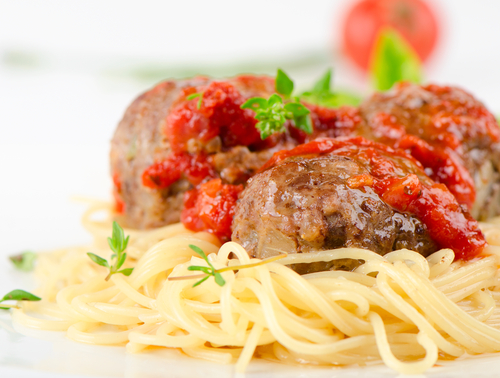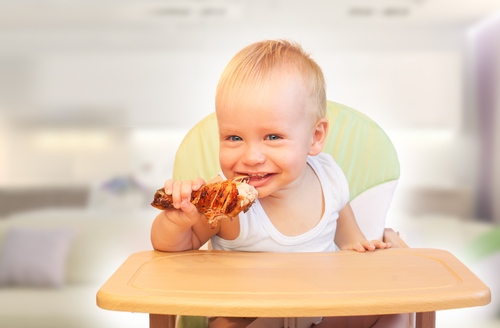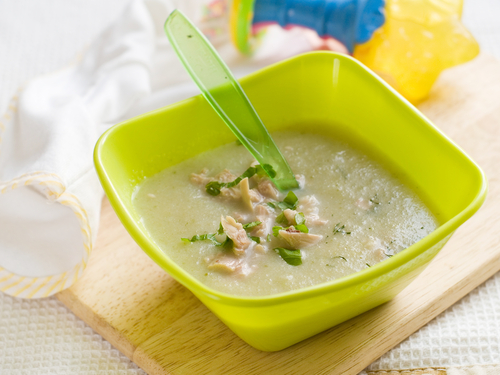A child does not eat meat: why is it dangerous for a growing organism?
A small child can do without meat. And there are many such parents. In some families, meat dishes are refused for ethical reasons, in others they observe fasts for religious reasons, in the third, mothers sit on vegetables and fruits in order to improve their health and reduce weight, and therefore their little one, especially if he is prone to frequent colds and completeness, are also transferred to a plant-based diet.
In fact, experts are unanimous in their opinion: they are incompatible! And there can be no other option here. After all, the rejection of animal protein for a child under the age of five leads to disastrous consequences for children's health.
The word "vegetarian" was coined by the founders of the British Vegetarian Society in the middle of the 19th century. It comes from the Latin "vegetus", which has two meanings: on the one hand - "vegetative", on the other - "healthy, vigorous, full of strength." It would seem that an exclusively plant-based diet should be suitable for a growing child's body by definition. But it's not. Because such a menu will never make your baby healthy, vigorous and full of energy.
5 reasons why vegetarianism is contraindicated for children
1. When a child is transferred to a plant-based diet, protein metabolism is disturbed. Therefore, nutritionists do not exclude animal protein for children, even with severe kidney disease, in which adults are shown to categorically refuse to eat meat. At early and preschool age, this cannot be allowed, otherwise the full development of the body will stop, growth will stop. After all, proteins serve as plastic substances for cells - blocks and bricks, from which body tissues are built in the process of growth, primarily muscles, including the heart.
2. The blood pigment hemoglobin also has a protein nature, which carries oxygen from the lungs to the tissues, and transports carbon dioxide in the opposite direction. When the level of hemoglobin decreases, tissues and organs begin to suffocate - anemia develops. For its prevention, vitamin B12 is needed, the main source of which is meat, as well as protein of animal origin, complete in amino acid composition: it consists of 20–21% iron of organic origin, which is most fully absorbed by the digestive system of the crumbs.
3. The immune system also weakens - after all, the defense system also works on a protein basis. Its cells produce specific proteins - interferons, complement system proteins, immunoglobulins of classes A, E and G (they neutralize microbes and allergens that attack the child's body).

4. Vision also "sits down" due to clouding of the lens and pigmentary degeneration of the retina, because the pigments inside its cells are also proteins! Such changes in the organ of vision usually occur in old age, but in children from traditionally vegetarian families, they can develop in the first years of life, and the faster the younger the child.
5. All hormones, led by the most important - somatotropic, which is responsible for growth, belong to substances of a protein nature. And how do you order the baby to grow if the body has nothing to produce this hormone from?
There is no substitute for meat for children
The main argument of vegetarian parents is that if a child is fed enough vegetables and fruits, he will also receive protein, only vegetable, the sources of which are beans, beans, peas, lentils. But the fact is that people belong to the highest realm of nature, in which life is a way of existence of protein bodies. And these same bodies, especially small ones, need animal protein, because it differs significantly in composition from vegetable protein: the latter lacks a number of essential amino acids, without which the child’s body can’t even grow.
“But what about calves, foals and other kids? – you will reasonably notice. “They chew their own hay and grow beautifully.” But it turns out that in the intestines of herbivores there are microorganisms that produce essential amino acids that are not found in plant foods. And in the human digestive system, these bacteria do not take root.

Also, many mothers ask if it is possible to replace meat in the child's diet with cheese, cottage cheese, eggs, milk, kefir? All these are also sources of animal protein for children. But the problem is that these products lack iron. And, by the way, from plant foods - cereals, vegetables and fruits - it is practically not absorbed.
Meat for children: eat like an adult
By 12 months, most toddlers have about 8 teeth erupted. It's time to give them a job! Therefore, gradually accustom the child to meat souffle, or meatballs: let him learn to bite off small pieces and chew them. And do not be upset if he perceives a new dish with hostility. Go for the trick: start with small pieces of soufflé, alternating them with vegetable puree, and gradually increase the amount of meat, giving it to the crumbs separately from the side dish. Steam minced meat dishes, not in a frying pan: the enzyme systems of the stomach and intestines of the crumbs are not yet ready to digest fried food. You can only lightly fry the cutlets for children in sunflower or olive oil (but not butter or margarine!), Before stewing or placing in a double boiler.
And do not forget about the soup with meat for the child! In a year, it is already time to knead vegetables with a fork, and divide well-boiled meat into fibers. A one and a half year old baby does an excellent job with such a dish, which means that from this age it is time to make new adjustments to the soup recipe: cook it like for adults, just cut the meat and vegetables into small pieces. But just do not use any rich meat broths, cook.

Fried meat, smoked sausages, "adult" stew in canned food are contraindicated for a small child. But after a year and a half, boiled sausage can already be given 1-2 times a week, but only of high quality and low-fat, for example, Doctor's. Offer the baby and sausages, but up to three years old, special children's ones are better. If they are not available, regular dairy or cream ones will do. And of course, smoked sausages, as well as sausages and sausages, children under five years old should not be fed.
With all the benefits of meat dishes, a child does not need and is even harmful to eat animal food from morning to evening. Excessive protein load to the child's body is useless! Moreover, the crumbs will benefit from days without meat - fish, cottage cheese, vegetarian. The main thing is that there should be no more than two of them per week, provided that you will arrange purely “plant” days for the baby no more than two or three times a month.
Why doesn't the child eat meat?
If the child does not eat meat, you can not force-feed him or force him to swallow at least a piece by any means. But to figure out why the child refuses animal protein is necessary.
- Take a closer look at the baby: is he healthy, has he caught viruses? Meat for a child requires considerable expenses for its digestion and assimilation. That is why patients often do not even want to see him when their body is fighting a respiratory infection.
- Aversion to meat in a child can be associated not only with a cold, but also with an intestinal infection. Also rule out diseases of the digestive system (chronic gastritis, reactive pancreatitis, biliary dyskinesia, hepatitis) and kidney problems.
- Some other diseases also signal themselves by the disappearance of appetite, and in the first place - to meat dishes. Consult your pediatrician to find the cause.
- And although there are many reasons for children to refuse meat, it cannot last forever. When the disease passes, the appetite for cutlets returns, indicating that the child is on the mend!
